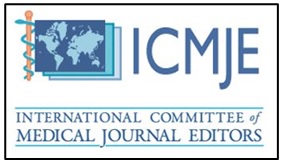Validation of teixeira optic magnifying fice vascular pattern of colorectal lesions with optic magnifying nbi: a pilot study
Palabras clave:
Colorectal tumors, colorectal adenomas, colorectal adenocarcinoma, magnifying NBI, magnifying FICE, vascular pattern.Resumen
Objective: A recent classification of the vascular pattern (VP) of colorectal polyps was introduced by Teixeira et al, using magnifying FICE. This pilot study aims to achieve Teixeira’s FICE VP classification (TVP) of colorectal lesions through NBI magnification. Methods: From 2010 to 2011, 32 patients and 54 colorectal lesions were evaluated at Centro Médico Docente La Trinidad (CMDLT), Department of Gastroenterology, Caracas-Venezuela. Olympus magnifying colonoscopies and NBI were performed by three independent endoscopists, using the TVP classification. A fourth endoscopist of Porto Alegre-Brazil from the Department of Gastroenterology of FUGAST received the electronic files of the 54 cases in a digital image filing system. Random numbers of 54 pictures were allocated to readers 1 to 4. Diagnostic accuracy of the TVP was determined against the histopathological diagnosis, as neoplasia or no neoplasia; adenoma with low/high grade dysplasia vs. deeply invasive adenocarcinoma. Kappa in reference to TVP was recorded. Specificity, sensibility, positive (PPV) and negative (PPN) predictive values to assess the neoplastic or non neoplastic nature of the lesion were determined. Results: Kappa values of 0.84259259 (0.63-0.84); Specificity (0.943 ± 0.013); sensibility (0.825 ± 0.126); PPV (0.960 ± 0.029) and PPN (0.765 ± 0.062) were obtained for TVP. Conclusions: This pilot study shows that a formerly TVP, can be reproduced with Olympus magnifying NBI. Since no VP classification has yet proven to be paramount in predicting the histology in colorectal lesions, a larger scale trial using both systems would be the best way to attain a more universal classification.
Descargas
Descargas
Cómo citar
Número
Sección
Licencia
Usted es libre de:
- Compartir — copiar y redistribuir el material en cualquier medio o formato
- Adaptar — remezclar, transformar y construir a partir del material
- para cualquier propósito, incluso comercialmente.
Bajo los siguientes términos:
-
Atribución — Usted debe dar crédito de manera adecuada, brindar un enlace a la licencia, e indicar si se han realizado cambios. Puede hacerlo en cualquier forma razonable, pero no de forma tal que sugiera que usted o su uso tienen el apoyo de la licenciante.
- No hay restricciones adicionales — No puede aplicar términos legales ni medidas tecnológicas que restrinjan legalmente a otras a hacer cualquier uso permitido por la licencia.












